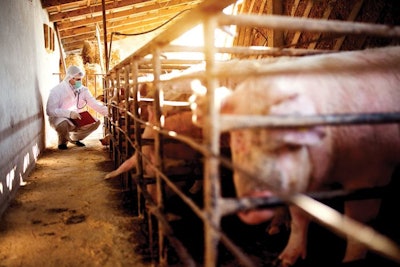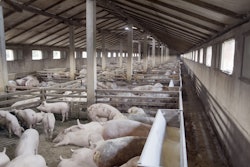
More than 900 pigs are to be culled after they were found to be infected with the African swine fever (ASF) virus in the Hong Kong Special Administrative Region of China. Like two previous outbreaks over recent weeks, the animals were kept at licensed farms in the Yuen Long district in the New Territories.
According to the territory's agriculture department, latest to test positive for the virus were 19 out of 30 samples from pigs at the premises in San Lin.
No signs of the disease have been reported at eight farms within 3 kilometers of the latest outbreak. However, the authority is testing the pigs at these farms, and a movement ban has been imposed on them as a precaution.
After a seven-month hiatus, the ASF virus was detected again in Hong Kong at the end of October. Source of the infection has not been identified. Ten of the pigs died, and the remaining 5,624 have been destroyed.
Since that development, a second outbreak was confirmed in the same district on November 22. According to the official notification to the World Organisation for Animal Health (WOAH), three of the 1,957 pigs at that facility showed symptoms of ASF, and the whole herd has been culled.
ASF detected on farms in Malaysia, Russia’s Far East
At the end of October, outbreaks were confirmed by the national veterinary authority at two more farms in Western Malaysia.
According to a recent WOAH report, first to be affected was a premises with 835 pigs in Perak state. A few days later, the ASF virus was detected at a small farm with 12 animals in the adjacent state of Kedah.
Furthermore, eight additional cases have been confirmed in wild boar in a Perak forest.
Since the first cases of ASF in Western Malaysia more than two years ago, the veterinary authority has officially recorded a total of 104 outbreaks of the disease. As well as 87 cases in wild pigs, almost 75,200 domestic pigs have been directly impacted.
In the Russian Far Eastern federal district, ASF hit a large commercial farm in Primorskiy krai in the last week of November, according to a new report to WOAH. Approximately 100 of the more than 43,800 pigs at the premises died. This outbreak appears to be within 5 kilometers of a previous outbreak at a Rusagro unit.
Almost 190,000 domestic swine have been involved in the six outbreaks in Primorskiy since May. One wild boar has also tested positive for the virus over this period.
Meanwhile, in the Khabarovsk region in same federal district, the ASF virus was detected in a small backyard herd at the end of the month. According to the official notification, ASF had not been detected in this region since April 2022.
Disease developments in the Philippines
While no new outbreaks of ASF in the country have been reported over the past month by the Philippine News Agency (PNA), indications of the disease situation can be gained from recent reports about the pork industry.
In Iloilo province in the Western Visayas region, ASF has hit hard, reducing local supplies of pig meat by 33%, according to the PNA in mid-November.
Anticipating a recovery in the sector in this province, around 1,350 backyard hog raisers are preparing to receive small numbers of young “sentinel” pigs. To qualify, they must attend training on biosecurity, and equip their farms with a perimeter fence, footbaths, and cleaning and disinfection facilities.
In the same region, “thousands of hogs” have been lost to the disease in Negros Occidental province, reports PNA. However, as a sign of the situation improving, PNA reports that a swine nucleus breeding farm has been set up to provide animals for future restocking.
According to the same source, the Department of Agriculture for the Bicol region in south Luzon has warned local people to buy pork products for the coming festive season only from licensed vendors in order to prevent the further spread of the disease.
The ASF threat in the country is far from over. Active ASF outbreaks continue in 23 provinces in 11 regions, according to the latest Bureau of Animal Industry (BAI) update dated November 17. Compared with a previous update dated October 27, this represents reductions of seven provinces and one region (Northern Mindanao).
While the total number of regions affected by ASF since the first cases in 2019 remains at 17, BAI data indicated that number of affected communities continues to rise gradually.
ASF outbreaks elsewhere in Asia
In Western Malaysia, more than 25 metric tons of pig carcasses from a cold storage unit in Perak state have been destroyed, reported Malay Mail this month. This came after the discovery of two carcasses that tested positive for the ASF virus. The animals were found to have been slaughtered at an unlicensed slaughterhouse. Ongoing investigations could lead to fines of up to MYR10,000 (US$2,135). The destroyed carcasses were worth MYR502,000, and the facility has been subjected to thorough cleaning and disinfection.
To date, approximately 1,780 pigs have been destroyed as a result of ASF in the northeast Indian state of Manipur, reported The Sangai Express in the first week of December. Affected have been 1,462 pig herds in 430 villages around 33 disease epicenters. Authorities have undertaken the culling, cleaning and disinfection, and affected owners are awaiting financial compensation for the outbreaks, which started in October.
A senior veterinary official for Manipur has called for support to set up the state’s first facility to test for the ASF virus, according to the same source.
In Indonesia, the number of pigs affected by ASF so far this year has passed 59,600. This is up to December 7, and according to the latest update from the United Nations’ Food and Agriculture Organization. Outbreaks have occurred in eight provinces, with the most cases detected in Riau Islands and South Sulawesi.
According to the same source, 576 ASF outbreaks have been confirmed in Vietnam so far in 2023. More than 24,000 pigs have been culled to halt the spread of infection. Of the nation’s 63 provinces and cities, there have been recent cases in 27 across the country.
Since the first recorded cases in 2019, the number of ASF-infected wild boar in South Korea has reached 3,425, according to Pig & People (as of December 11).
This is an increase of 75 over a period of one month. Infected wild boar have been found in 39 cities/counties in four provinces. Meanwhile, the number of outbreaks in domestic pigs remains unchanged at 38.
Update on ASF vaccine development
The head of WOAH’s science department has called for one of the ASF vaccine producers in Vietnam to share more data on its products with international researchers before proceeding with further exports.
This year, the world’s first ASF vaccine was authorized for use in the country by the Vietnamese veterinary agency. WOAH has expressed concerns that this and other ASF vaccines are being widely exported before the results of tests on their efficacy and quality have been independently verified.
View our continuing coverage of the global African swine fever situation.
















